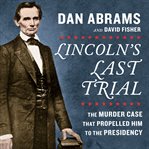Review by Booklist Review
Legal affairs journalist Abrams and coauthor Fisher illuminate a key marker on Abraham Lincoln's path to the White House. By the summer of 1859, some of Lincoln's staunchest supporters urged him to seek the Republican presidential nomination, and Lincoln, a highly successful and prominent Illinois attorney who had attracted national attention in the Lincoln-Douglas debates, was definitely interested. So his agreement to act as defense attorney in a murder trial in Springfield carried considerable political risks. After several earlier altercations, Quinn Harrison fatally stabbed Greek Crafton. Harrison's father was a prominent Republican and friend of Lincoln. Lincoln and cocounsel Stephen Logan based their strategy on self-defense, though Illinois standards of self-defense were particularly restrictive, and the presiding judge, possibly a political enemy of Lincoln, excluded critical testimony. Still, Lincoln and Logan soldiered on, and Lincoln was particularly effective, mixing a folksy demeanor and a sense of outrage at the injustice of the proceedings. The transcripts reveal Lincoln at his best, fighting for a cause he believed in with brilliance and passion qualities that would serve him so well as president.--Freeman, Jay Copyright 2018 Booklist
From Booklist, Copyright (c) American Library Association. Used with permission.
Review by Library Journal Review
In a readable but sometimes fanciful book, Abrams (chief legal affairs anchor for ABC News; Man Down) and veteran author Fisher recount Lincoln's last major trial, in 1859, which they insist carried national political implications because of Lincoln's prominence following the Lincoln-Douglas debates of 1858. In copious detail, they relate the murder trial in which Lincoln served as a defense counsel. The book is based on the trial transcript by politician Robert R. Hitt, a transcript that was discovered 30 years ago but has not been examined closely for what it reveals about Lincoln, the lawyer, until recently. Abrams and Fisher quote generously from Hitt's transcript to bring into sharp focus the witness-by-witness testimony and courtroom proceedings. They also provide instructive historical context on the development of legal practice, jury selection and duties, concepts of self-defense, courtroom pleadings, and Lincoln's recognized genius in cross-examination and closing arguments. However, the authors sacrifice credibility for readability by inventing musings and dialog by Hitt, Lincoln, and other principals. They never make a case for their hyperbolic subtitle; in fact, the trial was not Lincoln's last. Verdict A book that lets readers see Lincoln the lawyer in action but fails to prove its argument.-Randall M. Miller, St. Joseph's Univ., Philadelphia © Copyright 2018. Library Journals LLC, a wholly owned subsidiary of Media Source, Inc. No redistribution permitted.
(c) Copyright Library Journals LLC, a wholly owned subsidiary of Media Source, Inc. No redistribution permitted.
Review by Kirkus Book Review
A study of a murder trial with potential implications for the political career of our 16th president.Abraham Lincoln was involved in thousands of cases in his distinguished legal career, few more intriguing than the 1859 murder trial of "Peachy" Quinn Harrison. ABC News chief legal affairs anchor Abrams (Man Down: Proof Beyond a Reasonable Doubt That Women Are Better Cops, Drivers, Gamblers, Spies, World Leaders, Beer Tasters, Hedge Fund Managers, and Just About Everything Else, 2011) and prolific author Fisher (co-author, with Richard Garriott: Explore/Create, 2017, etc.) assert that Lincoln's successful defense of Harrison served as a springboard to the 1860 Republican presidential nomination. In July 1859, Greek Crafton physically attacked Harrison in a drugstore; Harrison responded by stabbing Crafton with a knife, mortally wounding him. A grand jury indicted Harrison for murder, prompting his father to hire Lincoln and Stephen Logan, Lincoln's former law partner, as defense attorneys. What unfolded was a dramatic trial, a complete transcript of which was kept by stenographer and future congressman Robert R. Hitt. Harrison's acquittal was largely due to the judge's decision to allow Peter CartwrightHarrison's grandfather and loser of an 1846 congressional election to Lincolnto testify that Crafton had given a deathbed absolution of Harrison. Lincoln's dramatic closing argument before the jury may have also played a role. Abrams and Fisher adeptly place the Harrison trial within the context of Lincoln's legal career and his well-known skills before a jury, but they fail to support their argument that the case "propelled" Lincoln to the presidency. The case had nothing to do with slavery, the dominant issue of the 1860 presidential campaign and election. Moreover, there are several examples of inaccurate datese.g., the Comstock silver lode was made public in 1859 but possibly discovered a year or two earlierand the authors admit that at times, "we had to deduce what was said [by Lincoln and others and]suggest appropriate thoughts and/or mannerisms."The story of Lincoln and the Harrison murder trial is intriguing but not necessarily significant enough to merit its own book. Copyright Kirkus Reviews, used with permission.
Copyright (c) Kirkus Reviews, used with permission.

